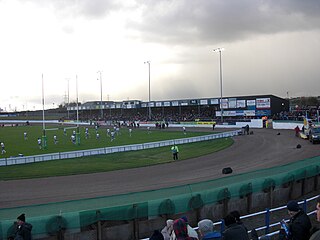Derwent Park is a major sports complex in northern England.
Derwent Park may also refer to:
- Derwent Park, Tasmania, a suburb of Hobart
- Derwent Park (Rowlands Gill), a park in Tyne and Wear, England
Derwent Park is a major sports complex in northern England.
Derwent Park may also refer to:
Derwent derives from the Brythonic term Derventio, meaning "valley thick with oaks". It may refer to:

Derwentwater or Derwent Water, is one of the principal bodies of water in the Lake District National Park in north west England. It lies wholly within the Borough of Allerdale, in the county of Cumbria.

The Derwent is a river in Yorkshire in the north of England. It flows from Fylingdales Moor in the North York Moors National Park, east then southwards as far as its confluence with the River Hertford then westwards through the Vale of Pickering, south through Kirkham Gorge and the Vale of York, joining the River Ouse at Barmby on the Marsh. The confluence is unusual in that the Derwent converges on the Ouse at a shallow angle in an upstream direction.
There are two Derwent Reservoirs in England:
River Derwent or Derwent River may refer to:

Ladybower Reservoir is a large Y-shaped, artificial reservoir, the lowest of three in the Upper Derwent Valley in Derbyshire, England. The River Ashop flows into the reservoir from the west; the River Derwent flows south, initially through Howden Reservoir, then Derwent Reservoir, and finally through Ladybower Reservoir. The reservoir is owned by Severn Trent.

Workington is a coastal town and civil parish at the mouth of the River Derwent on the west coast in Cumberland, Cumbria, England. At the 2011 census it had a population of 25,207.

The River Wye is a limestone river in the Peak District of Derbyshire, England. It is 22 miles long, and is one of the major tributaries of the River Derwent, which flows into the River Trent, and ultimately into the Humber and the North Sea.

Consett is a town in County Durham, England, about 14 miles (23 km) south-west of Newcastle upon Tyne. It had a population of 27,394 in 2001 and an estimate of 25,812 in 2019.

The Derwent Reservoir is a reservoir on the River Derwent, on the border between County Durham and Northumberland, in England. It is west of Consett. It is 3.5 miles (5.6 km) long) and covers an area of 4 km2 and has a maximum depth of 100 ft (30m) and when full, holds 11,000 million gallons (50,000,000m³).

Matlock railway station is owned by Network Rail and managed by East Midlands Railway; it serves the Derbyshire Dales town of Matlock, Derbyshire, England. The station is the terminus of both the Derwent Valley Line from Derby and Peak Rail who operate heritage services to Rowsley South. Both lines are formed from portions of the Midland Railway's former main line to Manchester Central. Through running is technically possible but is not done in normal service.
Back Tor may refer to:

Norton-on-Derwent, commonly referred to as simply Norton, is a town and civil parish in North Yorkshire, England. Norton borders the market town of Malton, and is separated from it by the River Derwent. The 2001 Census gave the population of the parish as 6,943, increasing at the 2011 Census to 7,387.

Workington Town R.L.F.C. is a semi-professional rugby league club playing in Workington in west Cumbria.
The Derwent Valley Railway may refer to:

Derwent Park is a Rugby League Stadium and former motorcycle speedway in Workington, England situated beside the Cumbrian River Derwent. It is used mostly for rugby league matches and is the home stadium of Workington Town who play in League 1 the 3rd tier of Northern Hemisphere rugby league
Derwent Valley may refer to:

The Machine Gun Corps Memorial, also known as The Boy David, is a memorial to the casualties of the Machine Gun Corps in the First World War. It is located on the north side of the traffic island at Hyde Park Corner in London, near the Wellington Arch, an Equestrian statue of the Duke of Wellington, the Royal Artillery Memorial, the New Zealand War Memorial, and the Australian War Memorial.
The Derwent Valley Railway was a branch railway in County Durham, England. Built by the North Eastern Railway, it ran from Swalwell to Blackhill via five intermediate stations, and onwards to Consett.

Derwent Floodwash is a 1.8 hectare Local Nature Reserve and Site of Borough Importance for Nature Conservation, Grade II, in Morden Park in the London Borough of Merton. It is owned by the London Borough of Wandsworth and managed by Merton Council. The site borders Pyl Brook, and it is designed to store flood waters when the brook overflows, preventing flooding of properties downstream.